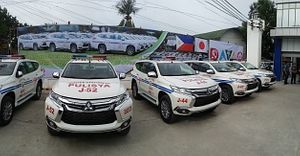On January 15, the Japanese government gave the Philippine police another batch of patrol vehicles as part of its ongoing assistance on this front. The move highlighted the security cooperation that is ongoing between Japan and the Philippines despite lingering concerns around Philippine President Rodrigo Duterte and some of his policies.
As I have noted before, relations between Japan and the Philippines date back decades, and despite worries about Duterte, Tokyo has continued strengthening ties with Manila on its own terms as well as part of its wider efforts to boost relations with Southeast Asian states (See: “Japan Reveals First ASEAN Defense Initiative with Vientiane Vision”).
This includes the security realm, where the two sides have been making further inroads on a number of fronts in recent months, including but not limited to countering terrorism, combating transnational crimes, and preserving maritime security in the Sulu-Sulawesi Seas (See: “Japan-Philippines Defense Ties in the Spotlight with New Vessels”).
One area where Tokyo had pledged to help Manila was in providing more equipment for law enforcement. Under the so-called Economic and Social Development Program on Counterterrorism and Public Security – which also includes funding from Japanese official development assistance (ODA) on various fronts from the reconstruction of Marawi City to the provision of coastal monitoring radar equipment – Japan had indicated that it would donate patrol vehicles to the Philippine National Police (PNP) to support Duterte’s emphasis on preserving law and order, which continues to produce concerns on various fronts.
The first batch of vehicles was donated last November, during the time when Manila was chairing a round of ASEAN summitry as the holder of the organization’s rotating chairmanship. At the time, Japanese Ambassador Koji Haneda had presided over the turnover ceremony for the first batch of 100 patrol vehicles for Metro Manila at the headquarters of the PNP in Camp Crame, estimated to cost around 500 million yen, along with other equipment such as bomb suits, ballistic shields, and bullet-proof vests and helmets.
On Monday, Haneda led the ceremonial turnover of an additional 26 Mitsubishi patrol vehicles to the PNP in Davao City. In his remarks at the ceremony, Duterte said the vehicles would not only strengthen the Philippines’ capability in fighting and suppressing regional crime, but also reinforce shared efforts by both countries to fight transnational crime, terrorism, and the proliferation of illegal drugs. Those comments came amid continued controversy about the conduct of the president’s so-called “war on drugs,” with the PNP recently reentering the fray as well.
The ceremonial turnover was also held in conjunction with the inauguration of a new Regional Crime Laboratory Office (RCLO) 11 building, which the Duterte government has characterized as a modern crime laboratory equipped with newly acquired advanced equipment to deliver quicker and more efficient services to the southern Philippines. Philippine officials have said that they hope the new facility, which will serve six regional police offices in Mindanao, will help reduce massive capability gaps, including the previous need for police to travel to Camp Crame for some procedures.































